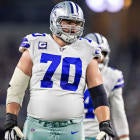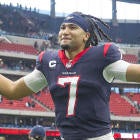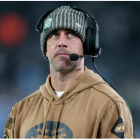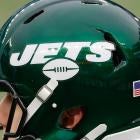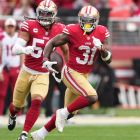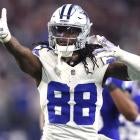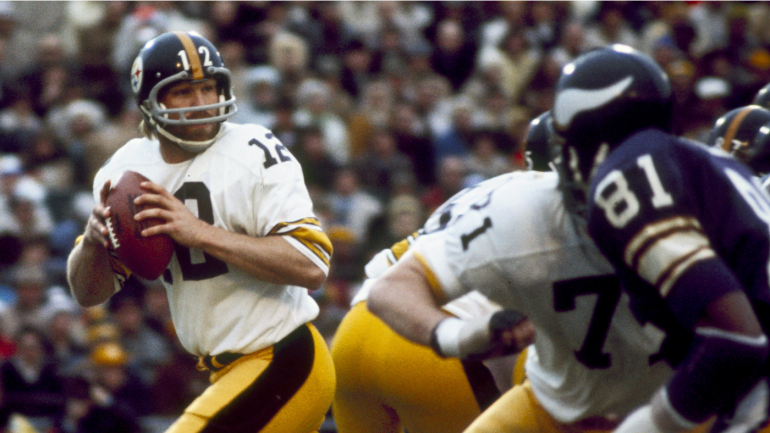
It's fitting that several of the NFL's iconic dynasties were defined in a city known for its glitz and glamour. On Sunday, the Cincinnati Bengals and Los Angeles Rams are hoping to etch their names alongside those teams by winning Super Bowl LVI.
Sunday's game will be the first Super Bowl played inside SoFi Stadium, which is only three miles away from The Forum, where Magic Johnson led the "Showtime" Lakers to five NBA championships during the 1980s. It will mark the first Super Bowl played in the Greater Los Angeles area since January of 1993, when a young team (similar to this year's Bengals squad) won their first of three Lombardi Trophies over a four-year span.
Below is a ranking of the Super Bowls that have been played in Golden State, a list this year's Super Bowl will join shortly after the conclusion of Sunday's game.
The criteria when ranking the best California Super Bowls included the following:
- Entertainment value
- Big plays on both sides of the ball
- Margin of victory
- Historic performances
12. Super Bowl XXXVII: Buccaneers 48, Raiders 21
Location: Qualcomm Stadium (San Diego)
Three late touchdown passes from the Raiders made the game look much more competitive than it actually was. Even with Oakland's late touchdowns, Tampa Bay's defense matched the Raiders' offense after returning three interceptions for scores. Led by Dwight Smith and game MVP Dexter Jackson, the Buccaneers picked off Rich Gannon a Super Bowl record five times. Smith returned both of his picks for scores, the second of which came with two seconds left and served as an appropriate end to the game.
When its defense wasn't wreaking havoc, Tampa Bay's offense put its own dents on the scoreboard. Keenan McCardell caught both of Brad Johnson's touchdown passes, while Michael Pittman gashed the Raiders' defense to the tune of 124 yards on 29 carries.
11. Super Bowl I: Packers 35, Chiefs 10
Location: Los Angeles Memorial Coliseum
How much has the Super Bowl changed? Tickets for Super Bowl I cost $12, as there were more than 30,000 empty seats when the AFL champion Chiefs faced the NFL champion Packers inside Los Angeles Memorial Coliseum. Ahead 14-10, the Packers turned a tight game into a rout shortly after Willie Wood intercepted Chiefs quarterback Len Dawson early in the second half. Bart Starr won MVP honors after throwing for 250 yards and two touchdown passes. Both scores went to 34-year-old receiver Max McGee, who famously played the game hungover after staying out until sunrise the day of the game.
10. Super Bowl XI: Raiders 32, Vikings 14
Location: Rose Bowl (Pasadena)
After losing in the conference championship in six of the previous eight years, John Madden's Raiders took their frustrations out on the Vikings, who suffered their fourth Super Bowl loss in seven years. Oakland's star-studded offensive line devastated Minnesota's famed "Purple People Eater" defensive front to the tune of 266 rushing yards on 52 carries. When the Raiders threw, quarterback Ken Stabler had success getting the ball to Fred Biletnikoff, who won MVP honors after making several catches that set up Oakland scores. The Raiders' defense put their stamp on the win when "Old Man" Willie Brown returned Fran Tarkenton's pass 75 yards for a touchdown.
Who remembers this iconic shot by NFL Films?! 🏃🎥 #TBT to Super Bowl XI and the legendary interception made by "Old Man Willie".@RAIDERS #RaiderNation pic.twitter.com/Rpf7VQnMk9
— NFL Films (@NFLFilms) January 25, 2018
9. Super Bowl XXI: Giants 39, Broncos 20
Location: Rose Bowl (Pasadena)
Down 10-9 at halftime, a fake punt ignited a 30-point second half for the Giants, who won their first Super Bowl under head coach Bill Parcells. Phil Simms won MVP honors after throwing three touchdowns while completing a Super Bowl record 88% of his passes. The Giants' defense, which recorded a critical goal line stand in the first half, was led by linebacker Carl Banks, who recorded 10 unassisted tackles that included four for a loss.
8. Super Bowl XXII: Washington 42, Broncos 10
Location: Jack Murphy Stadium (San Diego)
The Broncos led, 10-0, after one quarter, then trailed, 35-10, at halftime after being on the wrong end of the most prolific scoring output for one quarter in Super Bowl history. Game MVP Doug Williams threw four second-quarter touchdown passes that included passes of 80 and 50 yards to Ricky Sanders. Timmy Smith gained 58 of his Super Bowl record 204 rushing yards on his second quarter touchdown run.
Washington's defense more than did its part during that historic quarter. The unit forced three three-and-outs, while Barry Wilburn's interception of Elway with 1:11 left in the half set up Williams' eight-yard touchdown pass to Clint Didier to make it a 25-point game. Wilburn ended the Broncos' first drive of the second half with a second interception of Elway, who was largely held in check for the game's final 50 minutes after completing with a 56-yard touchdown pass to Ricky Nattiel on Denver's first offensive snap.
#WashingtonFootball lights up Super Bowl XXII with a magical, NFL postseason record 35-point second quarter explosion.
— Kevin Gallagher (@KevG163) January 31, 2022
Today in 1988 pic.twitter.com/jE5qCsZflM
7. Super Bowl XIX: 49ers 38, Dolphins 16
Location: Stanford Stadium
This game featured one of the greatest quarterback matchups in Super Bowl history. The 49ers were led by Joe Montana, who led the 49ers to a 15-1 record during the regular season. Miami was led by Dan Marino, who won league MVP honors after throwing for then-NFL records 5,084 yards and 48 touchdowns.
Montana and Marino both threw for over 300 yards, but Montana's mobility proved to be a key difference between the two legendary quarterbacks. Montana ran for 59 yards (a then-Super Bowl record for a quarterback), while Marino was constantly under siege by the 49ers' unrelenting pass rush. Miami took an early 10-7 lead before Montana led the 49ers on three consecutive drives that ended in the Dolphins' end zone. The 49ers then shut out the Dolphins in the second half while intercepting Marino twice. Montana, who won his second of three Super Bowl MVP trophies, threw two touchdown passes to halfback Roger Craig, while fellow running back Wendell Tyler gained 135 total yards.
No. 4: 1984 @49ers, @SuperBowl XIX Champions #GoNiners
— NFL (@NFL) November 16, 2019
📺: #NFL100 Greatest Teams on @NFLNetwork pic.twitter.com/2EbuqAuJ4X
6. Super Bowl 50: Broncos 24, Panthers 10
Location: Levi's Stadium (Santa Clara)
The first Super Bowl between former No. 1 overall picks was dominated by defense. Game MVP Von Miller set up both of Denver's touchdowns. His first-quarter strip-sack of Cam Newton was scooped up by Malik Jackson to give the Broncos a 10-0 lead. Miller's second strip-sack of Newton with 3:13 left set up C.J. Anderson's game-clinching touchdown run. Peyton Manning capped off his career with a completion to Bennie Fowler on Denver's subsequent two-point conversion.
5. Super Bowl VII: Dolphins 14, Washington 7
Location: Los Angeles Coliseum
From a historical standpoint, this game carries significant weight. The Dolphins capped off their 17-0 season by shutting out Washington's formidable offense, led by reigning league MVP Larry Brown. The Dolphins scored both of their touchdowns in the first half, led by Larry Csonka's 112 rushing yards. The game's most enduring play was Dolphins kicker Garo Yepremian's botched attempt of a throw that led to Washington's only touchdown. Safety Jake Scott's two interceptions earned him MVP honors.
4. Super Bowl XXVII: Cowboys 52, Bills 17
Location: Rose Bowl (Pasadena)
The score does not reflect the entertainment value this game had. The Cowboys' first Super Bowl win in 15 years included several big plays on both sides of the ball. It was actually a two-score game entering the fourth quarter before Alvin Harper's 45-yard touchdown opened the floodgates. The Cowboys would have set a Super Bowl record for points if not for Leon Lett's faux pass just short of the goal line.
As it was, Jimmy Johnson's team recorded the second-largest blowout win in Super Bowl history. Troy Aikman, the No. 1 overall pick in the 1989 NFL Draft, won MVP honors after throwing four touchdown passes that included a pair of scores to Michael Irvin. Emmitt Smith ran for 108 yards and a score while becoming the first NFL rushing champion to win the Super Bowl. Dallas' defense forced a Super Bowl record nine turnovers, as the Cowboys won their first Lombardi Trophy since January of 1978.
Super Bowl XXVII, OTD in 1993
— Kevin Gallagher (@KevG163) January 31, 2022
MVP Troy Aikman's stellar day (22-30, 273 yds, 4 TD) and a Super Bowl record 9 takeaways by the defense stake Dallas to a 52-17 win over the Bills at the Rose Bowl.#Cowboys' 3rd SB title
• Emmitt Smith: 135 total yds, TD
• Michael Irvin: 6-114-2 pic.twitter.com/i6ydEUabAl
3. Super Bowl XVII: Washington 27, Dolphins 17
Location: Rose Bowl (Pasadena)
Washington's first Super Bowl win included what was at the time the second-longest touchdown pass in Super Bowl history and the first kickoff return for a score in Super Bowl history. Ironically, Washington was on the wrong end of both milestones as it trailed Miami, 17-10, at intermission. Washington had tied the score on Joe Theismann's touchdown pass to Alvin Garrett before Fulton Walker returned the ensuing kickoff 98 yards for a score.
Dolphins quarterback David Woodley started the game with a 76-yard touchdown pass to Jimmy Cefalo, but he did not complete a single pass in the second half as Miami's offense was shut out in the game's final 30 minutes. On defense, the Dolphins had no answers for running back John Riggins, whose 42-yard touchdown run on a fourth-and-1 play gave Washington the lead for good. Riggins, whose touchdown run was at the time the longest in Super Bowl history, rushed for a then-Super Bowl record 166 yards. His 38 carries remains a Super Bowl record.
“@riggo44 will be remembered for his remarkable performance today.” 👏
— NFL Network (@nflnetwork) September 21, 2019
The @Redskins won Super Bowl XVII after his 4th down and 43-yard TD run for glory! #NFL100
📺: NFL 100 GREATEST PLAYS | Now on NFL Network pic.twitter.com/9ltLR8SKc3
2. Super Bowl XIV: Steelers 31, Rams 19
Location: Rose Bowl (Pasadena)
This game was much closer than the final score would indicate. Los Angeles, led by backup quarterback Vince Ferragamo, led the Steelers, 19-17, entering the fourth quarter. The Rams' defense intercepted Terry Bradshaw three times through three quarters, shut down Franco Harris and knocked receiver Lynn Swann out of the game with a concussion. A massive underdog, Los Angeles appeared destined to pull off the Super Bowl's biggest upset since the Jets shocked the Colts in Super Bowl III.
As they had done several times prior, the Steelers dug deep and made big plays when it mattered most. Facing a third-and-8 on his own 27-yard-line, Bradshaw connected on a 73-yard touchdown pass to John Stallworth that gave Pittsburgh a 24-19 lead. The Steelers' defense then came up with its own big play when Jack Lambert picked off Ferragamo's pass deep in Pittsburgh territory. Bradshaw then teamed up with Stallworth on another deep pass, this one for 45 yards. The completion set up Harris' game-clinching touchdown, as the Steelers won their fourth Super Bowl in six years.
This game was SUPER 😏
— Pittsburgh Steelers (@steelers) September 28, 2019
Coming in at #️⃣9️⃣2️⃣ on the #NFL100 Greatest Games countdown: Super Bowl XIV. pic.twitter.com/W9S4yWjqXx
1. Super Bowl XXXII: Broncos 31, Packers 24
Location: Qualcomm Stadium (San Diego)
A heavy underdog, the Broncos dethroned the Packers while ending the NFC's 13-year reign over the AFC in Super Bowls. John Elway's helicopter run symbolized his desire to win a ring after coming up short in his first three Super Bowls. A sentimental favorite heading into the game, Elway received an herculean effort from running back Terrell Davis, who won MVP honors after rushing for 157 yards and three touchdowns. Davis' final touchdown run with 1:47 left gave Denver the lead for good.
The Broncos' defense made just enough plays against Packers quarterback Brett Favre, who won his third consecutive league MVP award that season. Despite his three touchdown passes, Favre and the Packers came up short after Favre's misfired on his final three pass attempts after reaching the Broncos' 31-yard-line.
"Greatest game I've ever watched was Super Bowl XXXII. Had to see my man @JohnElway." - @CalaisCampbell
— NFL Network (@nflnetwork) October 5, 2019
A then 15-year veteran, the @Broncos QB finally won the big game 🏆
📺: NFL 100 GREATEST GAMES on NFL Network pic.twitter.com/zsmvOffARq











